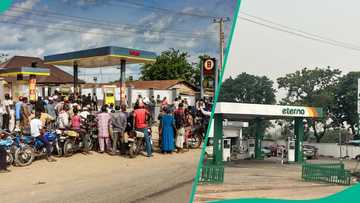Lagos Leads Nigeria's Fuel Consumption With 205.7 Million Liters of Petrol
- Regional differences in fuel usage reflect demographic and economic factors, witIn June, the Nigerian Midstream and Downstream Petroleum Regulatory Authority reported that Lagos, Ogun, and the Federal Capital Territory were the largest consumers of PMS
- The South-West region, led by Lagos, accounted for over a third of the national total, while Jigawa had the lowest allocation with just 9.4 million liters.
- Regional differences in fuel usage reflect demographic and economic factors, with significant consumption also noted in the South-South, North-Central, and North-West zones
Legit.ng journalist Zainab Iwayemi has 5-year-experience covering the Economy, Technology, and Capital Market.
Data supplied by the Nigerian Midstream and Downstream Petroleum Regulatory Authority has identified Lagos, Ogun, and the Federal Capital Territory, Abuja, as major consumers of Premium Motor Spirit (PMS).

Source: Getty Images
The June NMDPRA PMS shipment report showed that 1.44 billion liters of gasoline were distributed to states. Significant differences in the overall shipment highlighted the nation's demographic and economic characteristics.

Read also
Full list: 20 reasons Nigerians backed APC in the by-election and why Tinubu may win 2027 election
Of the 1.44 billion liters shipped to states, Lagos alone consumed 205.7 million liters, emphasizing its importance as Nigeria’s economic nerve center with a high need for fuel to run its bustling economy and transportation networks.
This is significantly more than the 132.7 million liters that the five South-East states used during the reviewed period. Following closely are Ogun and the FCT, with 88.7 million and 77.5 million liters, respectively. The only Nigerian state that shares a border with Lagos is Ogun, an industrial area; Abuja is the capital.
In June, Oyo, a state near Lagos, received 72.8 million liters of PMS. Jigawa had the lowest allocation, with 9.4 million liters. Following Jigawa were Ebonyi (10.5 million liters), Yobe (11.7 million liters), and Bayelsa (11.9 million liters), indicating regional differences in population or fuel usage.
With 452.95 million liters, accounting for more than one-third of the national total, the South-West zone was the largest regional user. In addition, Osun received 35.48 million liters, Ondo received 35.05 million liters, and Ekiti received 15.26 million liters. Lagos, Ogun, and Oyo took 205.7 million, 88.7 million, and 72.8 million liters, respectively.
With a distribution of 247.40 million liters, the North-Central zone came in second. In June, the FCT used 77.5 million liters, Niger used 40.7 million, Kwara used 34.8 million, Benue used 25.7 million, Nasarawa used 25.1 million, Kogi used 24.1 million, and Plateau used 19.4 million liters.

Source: Getty Images
According to reports, 230 million liters were used in the North-West in June. With 68.22 million liters, Kano was in first place, followed by Kaduna (43.13) and Sokoto (37.04). Jigawa had the lowest amount, 9.4 million liters, followed by Kebbi (30.31 million), Katsina (24.8 million), and Zamfara (17.04 million).
224.9 million liters were consumed overall in the South-South. With 68.5 million liters, Delta led the region, followed by Rivers (44.6 million) and Edo (43.1 million). Akwa Ibom followed with 33.8 million liters, Cross River had 23 million, while Bayelsa had one of the lowest nationwide at 11.9 million liters.
Dangote Refinery supplies 40 million litres of gasoline daily
Legit.ng reported that there has been an estimated shortfall of 9.8 million litres per day in Nigeria's domestic refining of Premium Motor Spirit (PMS), commonly referred to as gasoline.
Industry insiders stated that, in order to avoid any disruptions in the nation's petrol supply network, the imbalance is currently being filled through imports.
In addition to consistent amounts of Automotive Gas Oil (diesel), the Dangote Petroleum Refinery said over the weekend that it currently distributes more than 40 million litres of gasoline per day to the domestic market.
Source: Legit.ng


